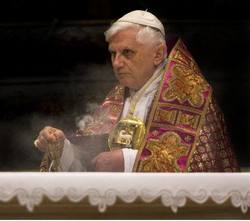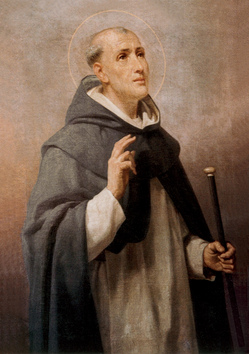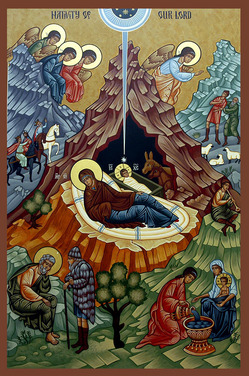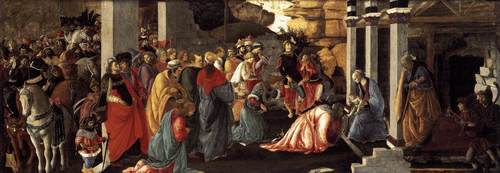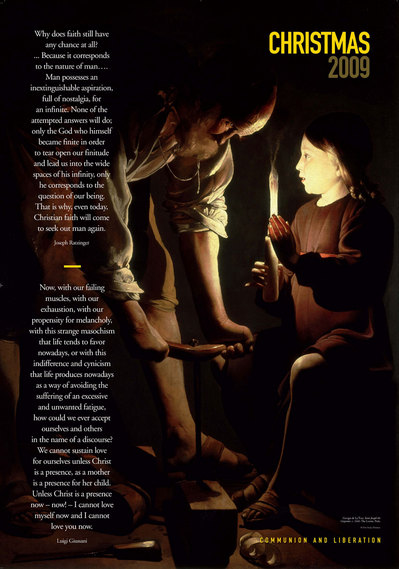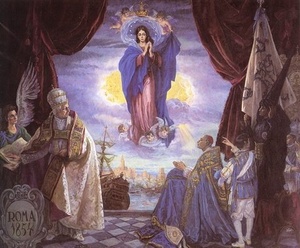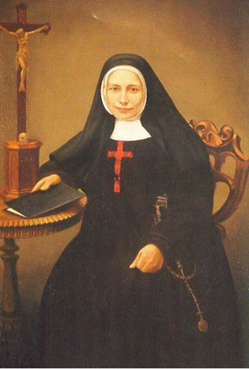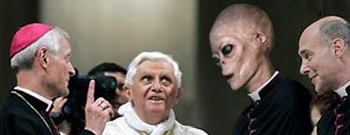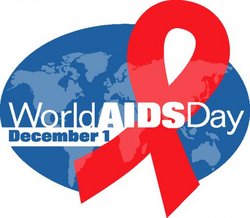Paul Zalonski: December 2009 Archives
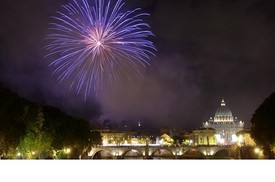 Now is the old year passed away.
Now is the old year passed away.Let us begin the new this day.
Praising our God, who here on earth
Kept us in quietness and mirth!
Oh, like the glad new year may we
Wholly renewed this day be,
Praising our God eternally!
Child of our love, O Jesus dear,
Thou who art still our Savior here,
Thee do we pray with all our heart:
Never more leave us, nor depart.
Save us from war, from hate, from fear;
Keep us in peace together here;
Grant us a tranquil, joyous year!
Gladly together then will we,
O highest God of heaven, to thee
Bring through the year our songs of praise,
And evermore through endless days
Here will on earth our time shall be,
And then, throughout eternity,
Singing with joyful hearts to Thee!
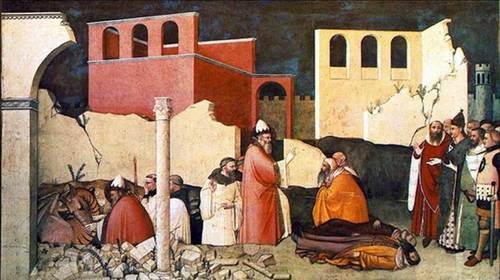
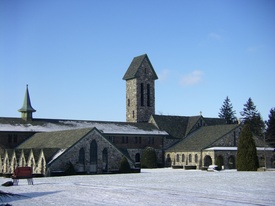 I spent a few hours today at Saint Joseph's Abbey in Spencer, MA, and then later in the day had lunch with a friend, Msgr. Robert Johnson in Worcester. It was beautifully sunny but incredibly cold.
I spent a few hours today at Saint Joseph's Abbey in Spencer, MA, and then later in the day had lunch with a friend, Msgr. Robert Johnson in Worcester. It was beautifully sunny but incredibly cold.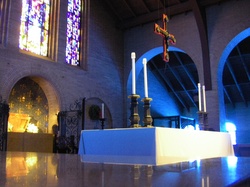
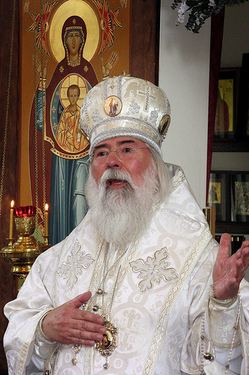 Last week the Lord called to Himself Orthodox
Church of America's Archbishop Job. After a serious of religious services in Illinois, Ohio and Pennsylvania, where he was buried. Since hearing of the archbishop's sudden death of pulmonary embolism, I've kept +Job in prayer, and I urge you to do the same.
Last week the Lord called to Himself Orthodox
Church of America's Archbishop Job. After a serious of religious services in Illinois, Ohio and Pennsylvania, where he was buried. Since hearing of the archbishop's sudden death of pulmonary embolism, I've kept +Job in prayer, and I urge you to do the same.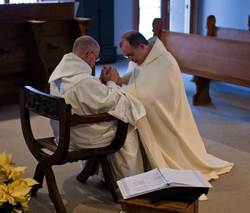 One the subtle joys in life that I relish is the fact that some people respond to the Lord's call to follow and serve Lord and His Church. Among the various ways to respond to the Lord is the monastic way of life under the Rule of Saint Benedict, living side-by-side others doing the same. Some may follow the monastic way as a Benedictine monk (nun) or perhaps as Cistercian monk (nun); AND just for the record, Cistercians are an 11th century reform of Benedictine monasticism. In this country there are few monasteries of Cistercian monks (only 4) but there are 12 houses of the reform of the reform called Cistercians of the Strict Observance (AKA Trappists).
One the subtle joys in life that I relish is the fact that some people respond to the Lord's call to follow and serve Lord and His Church. Among the various ways to respond to the Lord is the monastic way of life under the Rule of Saint Benedict, living side-by-side others doing the same. Some may follow the monastic way as a Benedictine monk (nun) or perhaps as Cistercian monk (nun); AND just for the record, Cistercians are an 11th century reform of Benedictine monasticism. In this country there are few monasteries of Cistercian monks (only 4) but there are 12 houses of the reform of the reform called Cistercians of the Strict Observance (AKA Trappists).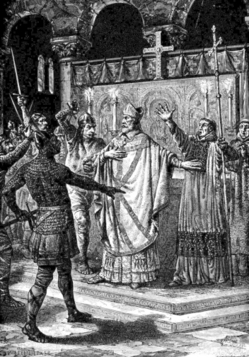
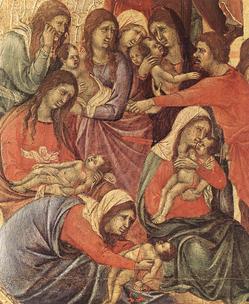 Our soul has been rescued like a bird from the fowler's snare.
Our soul has been rescued like a bird from the fowler's snare.
Father, the Holy Innocents offered you praise by the death they suffered for Christ. May our lives bear witness to the faith we profess with our lips.
from the Directory of Popular Piety and the Liturgy: The Feast of the Holy Innocents
Since the sixth century, on December 28, the Church has celebrated the memory of those children killed because of Herod's rage against Christ (cf. Mt 2:16-17). Liturgical tradition refers to them as the "Holy Innocents" and regards them as martyrs. Throughout the centuries Christian art, poetry and popular piety have enfolded the memory of the "tender flock of lambs" with sentiments of tenderness and sympathy. These sentiments are also accompanied by a note of indignation against the violence with which they were taken from their mothers' arms and killed.
In our own times, children suffer innumerable forms of violence which threaten their lives, dignity and right to education. On this day, it is appropriate to recall the vast host of children not yet born who have been killed under the cover of laws permitting abortion, which is an abominable crime. Mindful of these specific problems, popular piety in many places has inspired acts of worship as well as displays of charity which provide assistance to pregnant mothers, encourage adoption and the promotion of the education of children.
As recorded in the gospel of Matthew, after the visit of the Magi, Herod, in rage and jealousy, slaughtered all the baby boys in Bethlehem and surrounding countryside in an attempt to destroy his perceived rival, the infant Messiah. These "innocents" are honored by the Church as martyrs.
In countries where our own innocents are daily being slaughtered by abortion, this feast day is a special time to remember the unborn, to pray for their cause, and perhaps to picket or pray at facilities where unborn babies are killed through abortion. (113)
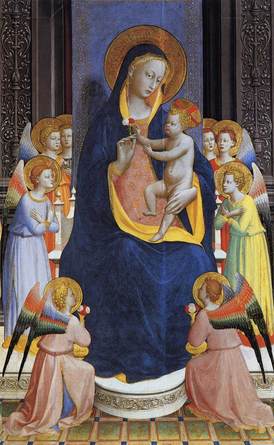
In Mary we praise that which places her above all others,
that is, fruitfulness of offspring together with virginity. For never has it
been known in this world that anyone was at the same time mother and virgin.
And see of Whom she is mother. Where does your astonishment at this so wondrous
dignity lead you? Is it not to this, that you may gaze in wonder yet never
sufficiently revere? Is she not in your veneration, no, in the esteem of Truth
itself, raised above choirs of angels? Does not Mary address the Lord and God
of all the angels as Son, saying: Son, why have you done so to us?
Who among the angels may thus presume? It is enough for them, and for them their greatest honor, that while they are spirits by nature they have become and are called angels, as David testifies: Who makes your angels spirits. [Ps.103: 4] Mary, knowing herself a mother, with confidence calls that Majesty Son Whom the angels in reverence serve. Nor does God disdain to be called that which He disdained not to be. For the Evangelist adds a little later: He was subject to them.
Who was subject to whom? A God to men. God, I repeat, to Whom are the angels subject: Whom principalities and powers obey: subject to Mary; and not alone to Mary, but to Joseph also, because of Mary. Admire and revere both the one and the other, and choose which you admire the more: the most sweet condescension of the Son, or the sublime dignity of the Mother. For either am I at a loss for words: for both are wondrous. For that God should obey a woman is humility without compare; and that a woman should have rule over God dignity without equal. In praise of virgins is it joyfully proclaimed: that they follow the lamb withersoever he goes. [Rev. 14: 4] Of what praise shall you esteem her worthy who also goes before Him?
Learn, O Man, to obey. Learn, O Earth, to be subject. Learn, O
Dust, to submit. The Evangelist in speaking of his Maker says: He was subject
to them; that is, without doubt, to Mary and to Joseph. Be you ashamed, vain
ashes that you are. God humbles Himself, and do you exalt yourself? God becomes
subject to men, and will you, eager to lord it over men, place yourself above
your Maker? O would that God might deign to make me, thinking such thoughts at
times in my own mind, such answer as He made, reproving him, to His apostle: Get behind me, Satan: because you savor not the things that are of God. [Mark 8:
33]
For as often as I desire to be foremost among men, so often do I seek to take precedence of God; and so do I not truly savor the things that are of God. For of Him was it said: And he was subject to them. If you disdain, O Man, to follow the example of a Man, at least it will not lower thee to imitate thy Maker. If perhaps you cannot follow Him wheresoever He goes, at least follow in that wherein He has come down to you.
If you are unable to follow Him on the sublime way of virginity, then follow God by that most sure way of humility; from whose straightness should some even from among the virgins go aside, then must I say what is true, that neither do they follow the Lamb to wherever he goes. He that is humble, even though he be stained, he follows the Lamb; so too does the proud virgin; but neither of the two whithersoever He goes: because the one cannot ascend to the purity of the Lamb that is without stain, nor will the other deign to come down to the meekness of the Lamb, Who stood silent, not merely before the shearer, but before the one that put Him to death. Yet the sinner [you and me] who follows Him in humility, has chosen a more wholesome part than the one that is proud in his virtue; since the humble repentance of the one washes away uncleanness, but the pride of the other contaminates his own virtue.
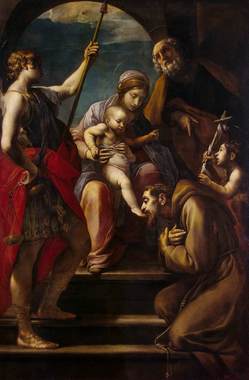
Truly blessed was Mary who possessed both humility and virginity. And truly wondrous the virginity of those whose fruitfulness is not stained, but adorned her; and truly singular the humility, which this fruitful virginity has not troubled, but rather exalted; and wholly incomparable the fruitfulness which goes hand in hand with her humility and her virginity. Which of these things is not wondrous? Which is not beyond all comparison? Which that is not wholly singular? It would be strange if you did not hesitate to decide which you regard as most worthy of praise: whether the wonder of fruitfulness of offspring in virginity, or of virginal integrity in a mother: sublimity of Offspring, or humility joined to such dignity: unless it be that we place both together above each one singly: and it is truly beyond any doubt more excellent and more joyful to have beheld these perfections united in her, than to see but one part of them.
And can we wonder that God, of
Whom it is written that He is wonderful in his saints, [Ps. 67: 36] shows
Himself in His own Mother yet more wondrous still. Venerate then, Ye spouses,
this integrity of flesh in our corruptible flesh. Revere likewise, you virgins,
fruitfulness in virginity. Let all men imitate the humility of God's Mother.
Honor, you angels, the Mother of your King, you who adore the Offspring of our
Virgin; Who is your King and our King, the Healer of our race, the Restorer of
our fatherland: Who among you is so sublime, yet among us was so lowly: to
Whose Majesty as well from you as from us let there be adoration and reverence:
to whose Perfection be there honor and glory and empire for ever and ever.
Amen.
What news, what news this bitter night,
When all is shuttered in the gloom?
No news except a baby born,
Who finds within an ox's stall his narrow room.
What men are these who hurry past?
What wonder do they run to see?
Shepherds who heart the herald song,
Who haste in stable to adore the mystery.
What child is this who, sleeping, makes
The manger throne his resting place?
None but the King of heaven high,
Born into dying to redeem our fallen race!
What shall I bring to honor Him?
What homage pay, what poor gift give?
Naught but your heard which, dead in sin,
Finds in this Child redeeming love---and strength to live!
The poem is by the late Dr. Henry Letterman, longtime professor of English at Concordia Teachers College, River Forest, IL. Dr. Richard Hillert, of the same institution, put this poem to music for Grace Lutheran Church, River Forest, IL. It was recorded by the Schola Cantorum of St. Peter's in the Loop in 1992.
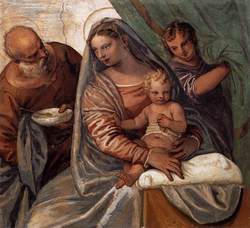 Father, help us to live as a holy family, united in
respect and love. Bring us to the joy and peace of your eternal home.
Father, help us to live as a holy family, united in
respect and love. Bring us to the joy and peace of your eternal home.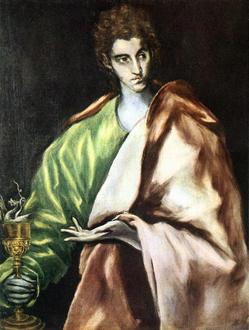
Priest: Our help is in the name of the Lord.
All: Who made heaven and earth.
Priest: The Lord be with you.
All: May He also be with you.
Let us pray. If it please you, Lord God, bless + and consecrate + this vessel of wine (or any other beverage) by the power of your right hand; and grant that, through the merits of Saint John, apostle and evangelist, all your faithful who drink of it may find it a help and a protection. As the blessed John drank the poisoned potion without any ill effects, so may all who today drink the blessed wine in his honor be delivered from poisoning and similar harmful things. And as they offer themselves body and soul to you, may they obtain pardon of all their sins. We ask this through Christ our Lord
All: Amen.
Lord, bless + this creature drink, so that it may be a health-giving medicine to all who use it; and grant by your grace that all who taste of it may enjoy bodily and spiritual health in calling on your holy name. We ask this through Christ our Lord.
All: Amen.
May the blessing of almighty God, Father, Son, + and Holy Spirit, come on this wine (or any other beverage) and remain always.
All: Amen.
At the end of the principal Mass on the feast of Saint John, Apostle and Evangelist, (after the last Gospel if during the Mass of Blessed John XXIII), the priest, retaining all vestments except the maniple, blesses wine brought by the people. This is done in memory and in honor of Saint John, who drank without any ill effects the poisoned wine offered to him by his enemies. The wine is sprinkled with holy water. If the blessing is given privately outside of Mass, the priest is vested in surplice and stole and performs the ceremony as given above.
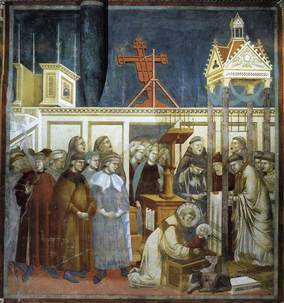
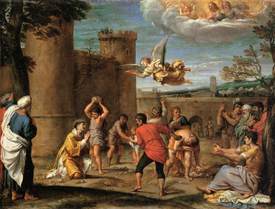
Lux fulgebit hodie super nos, quia natus est nobis Dominus.
(A light will shine on us this day, the Lord is born for us.)
(Roman Missal, Christmas, Entrance Antiphon for the Mass at Dawn)
The liturgy of the Mass at Dawn reminded us that the night is now past, the day has begun; the light radiating from the cave of Bethlehem shines upon us.
The Bible and the Liturgy do not, however, speak to us about a natural light, but a different, special light, which is somehow directed to and focused upon "us", the same "us" for whom the Child of Bethlehem "is born". This "us" is the Church, the great universal family of those who believe in Christ, who have awaited in hope the new birth of the Savior, and who today celebrate in mystery the perennial significance of this event.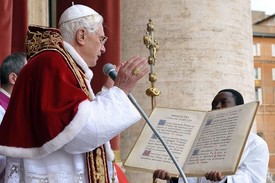 At first, beside the manger in Bethlehem, that "us" was almost imperceptible to human eyes. As the Gospel of Saint Luke recounts, it included, in addition to Mary and Joseph, a few lowly shepherds who came to the cave after hearing the message of the Angels. The light of that first Christmas was like a fire kindled in the night. All about there was darkness, while in the cave there shone the true light "that enlightens every man" (Jn 1:9). And yet all this took place in simplicity and hiddenness, in the way that God works in all of salvation history. God loves to light little lights, so as then to illuminate vast spaces. Truth, and Love, which are its content, are kindled wherever the light is welcomed; they then radiate in concentric circles, as if by contact, in the hearts and minds of all those who, by opening themselves freely to its splendour, themselves become sources of light. Such is the history of the Church: she began her journey in the lowly cave of Bethlehem, and down the centuries she has become a People and a source of light for humanity. Today too, in those who encounter that Child, God still kindles fires in the night of the world, calling men and women everywhere to acknowledge in Jesus the "sign" of his saving and liberating presence and to extend the "us" of those who believe in Christ to the whole of mankind.
At first, beside the manger in Bethlehem, that "us" was almost imperceptible to human eyes. As the Gospel of Saint Luke recounts, it included, in addition to Mary and Joseph, a few lowly shepherds who came to the cave after hearing the message of the Angels. The light of that first Christmas was like a fire kindled in the night. All about there was darkness, while in the cave there shone the true light "that enlightens every man" (Jn 1:9). And yet all this took place in simplicity and hiddenness, in the way that God works in all of salvation history. God loves to light little lights, so as then to illuminate vast spaces. Truth, and Love, which are its content, are kindled wherever the light is welcomed; they then radiate in concentric circles, as if by contact, in the hearts and minds of all those who, by opening themselves freely to its splendour, themselves become sources of light. Such is the history of the Church: she began her journey in the lowly cave of Bethlehem, and down the centuries she has become a People and a source of light for humanity. Today too, in those who encounter that Child, God still kindles fires in the night of the world, calling men and women everywhere to acknowledge in Jesus the "sign" of his saving and liberating presence and to extend the "us" of those who believe in Christ to the whole of mankind.
Wherever there is an "us" which welcomes God's love, there the light of Christ shines forth, even in the most difficult situations. The Church, like the Virgin Mary, offers the world Jesus, the Son, whom she herself has received as a gift, the One who came to set mankind free from the slavery of sin. Like Mary, the Church does not fear, for that Child is her strength. But she does not keep him for herself: she offers him to all those who seek him with a sincere heart, to the earth's lowly and afflicted, to the victims of violence, and to all who yearn for peace. Today too, on behalf of a human family profoundly affected by a grave financial crisis, yet even more by a moral crisis, and by the painful wounds of wars and conflicts, the Church, in faithful solidarity with mankind, repeats with the shepherds: "Let us go to Bethlehem" (Lk 2:15), for there we shall find our hope.
The "us" of the Church is alive in the place where Jesus was born, in the Holy Land, inviting its people to abandon every logic of violence and vengeance, and to engage with renewed vigour and generosity in the process which leads to peaceful coexistence. The "us" of the Church is present in the other countries of the Middle East. How can we forget the troubled situation in Iraq and the "little flock" of Christians which lives in the region? At times it is subject to violence and injustice, but it remains determined to make its own contribution to the building of a society opposed to the logic of conflict and the rejection of one's neighbour. The "us" of the Church is active in Sri Lanka, in the Korean peninsula and in the Philippines, as well as in the other countries of Asia, as a leaven of reconciliation and peace. On the continent of Africa she does not cease to lift her voice to God, imploring an end to every injustice in the Democratic Republic of Congo; she invites the citizens of Guinea and Niger to respect for the rights of every person and to dialogue; she begs those of Madagascar to overcome their internal divisions and to be mutually accepting; and she reminds all men and women that they are called to hope, despite the tragedies, trials and difficulties which still afflict them. In Europe and North America, the "us" of the Church urges people to leave behind the selfish and technicist mentality, to advance the common good and to show respect for the persons who are most defenceless, starting with the unborn. In Honduras she is assisting in process of rebuilding institutions; throughout Latin America, the "us" of the Church is a source of identity, a fullness of truth and of charity which no ideology can replace, a summons to respect for the inalienable rights of each person and his or her integral development, a proclamation of justice and fraternity, a source of unity.
In fidelity to the mandate of her Founder, the Church shows solidarity with the victims of natural disasters and poverty, even within opulent societies. In the face of the exodus of all those who migrate from their homelands and are driven away by hunger, intolerance or environmental degradation, the Church is a presence calling others to an attitude of acceptance and welcome. In a word, the Church everywhere proclaims the Gospel of Christ, despite persecutions, discriminations, attacks and at times hostile indifference. These, in fact, enable her to share the lot of her Master and Lord.
Dear Brothers and Sisters, how great a gift it is to be part of a communion which is open to everyone! It is the communion of the Most Holy Trinity, from whose heart Emmanuel, Jesus, "God with us", came into the world. Like the shepherds of Bethlehem, let us contemplate, filled with wonder and gratitude, this mystery of love and light! Happy Christmas to all!
Benedictus PP XVI, Christmas 2009
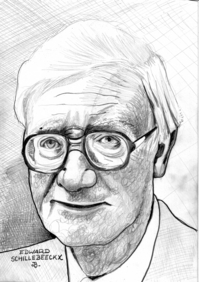
There is a phrase of Dostoevsky that accompanies me these days, when I have to speak of Christianity to all kinds of people in Italy and abroad: "Can an educated man, a European of our time, believe--truly believe--in the divinity of the Son of God, Jesus Christ?" This question rings like a challenge for all of us. It is precisely on the answer to this question that the success of the faith depends today. In an address given in 1996, the then cardinal Ratzinger answered that faith can have this hope "because it finds a correspondence in human nature. In man there is a nostalgic hope for the infinite that cannot be extinguished." In this phrase he indicated the condition necessary: that Christianity needs to find the humanity that pulsates in each of us in order to show all the greatness of its claim.
Yet how many times are we tempted to look at the concrete humanity in which we find ourselves--for example the unease, the dissatisfaction, the sadness, the boredom--as an obstacle, a complication, an impediment to the realization of what we desire. Thus we get angry with ourselves and with reality, succumbing to the weight of circumstances, in the illusion of going ahead by cutting away a piece of ourselves. But unease, dissatisfaction, sadness, and boredom are not symptoms of a illness to treat with medicines; this happens more and more often in a society that mistakes disquiet of the heart for panic and anxiety. They are rather signs of what the nature of the "I" is. Our desire is greater than the whole universe. The perception of emptiness in us and around us of which Leopardi speaks ("want and emptiness"), and the boredom of which Heidegger speaks, are the proof of the inexorable nature of our heart, of the boundless character of our desire--nothing is able to give us satisfaction and peace. We can forget it, betray it, or even deceive it, but we cannot shuffle it off.
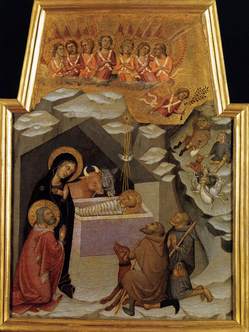
So the real obstacle on our journey is not our concrete humanity, but disregard for it. Everything in us cries out the need for something to fill the void. Even Nietzsche perceived this; he could not but address the "unknown god" that makes all things. "Left alone, I raise my hands/ ... to the unknown god / I want to know you, you the Unknown,/ Who penetrate deep into my soul, / Shake up my life like a storm,/ Beyond my grasp and yet so close to me!" (1864).
Christmas is the announcement that this unknown Mystery has become a familiar presence, without which none of us could remain a man for long, but would end up overwhelmed by confusion, seeing his own face decompose, because "only the divine can 'save' man, that is to say, the true and essential dimensions of the human figure and his destiny" (Fr. Giussani).
The most convincing sign that Christ is God, the greatest miracle that astonished everyone--even more than the healing of cripples and the curing of the blind--was an incomparable gaze. The sign that Christ is not a theory or a set of rules is that look, which is found throughout the Gospel: His way of dealing with humanity, of forming relationships with those He met on His way. Think of Zacchaeus and of Magdalene: He didn't ask them to change, but embraced them, just as He found them, in their wounded, bleeding humanity, needful of everything. And their life, embraced, re-awoke in that moment in all its original profundity. Who would not want to be reached by such a look now? For "one cannot keep on living unless Christ is a presence like a mother is a presence for her child, unless Christ is a presence now - now! -I cannot love myself now and I cannot love you now" (Fr. Giussani). This is the only way, as men of our time, reasonably and critically, to answer Dostoevsky's question.
But how do we know that Christ is alive now? Because his gaze is not a fact of the past, but is still present in the world just as it was before. Since the day of His resurrection, the Church exists only in order to make God's affection an experience, through people who are His mysterious Body, witnesses in history today of that gaze capable of embracing all that is human.
Father Julián Carrón, President of the Fraternity of Communion & Liberation
Corriere della Sera, 24 December 2009
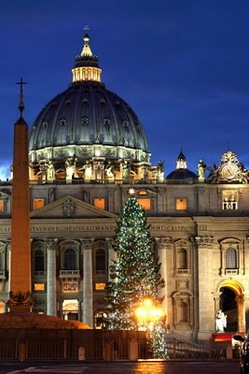 The Pope received the bishop and a delegation from Wallonia, from
where this year's Vatican Square Christmas tree came from, to say thank you for gift on behalf of the Church. He said, "The role
of this tree is similar to that of the shepherds who, watching through the
shades of night, saw how the darkness was illuminated with the message of the
angels. ... Standing next to the nativity scene the tree indicates, in its own
particular way, the great mystery present in the poor and simple grotto. It
proclaims the arrival of the Son of God to the inhabitants of Rome, to pilgrims
and to everyone who sees St. Peter's Square on television. Though this tree
your land, and the faith of the Christian communities in your region, greet the
Christ Child." (Benedict XVI)
The Pope received the bishop and a delegation from Wallonia, from
where this year's Vatican Square Christmas tree came from, to say thank you for gift on behalf of the Church. He said, "The role
of this tree is similar to that of the shepherds who, watching through the
shades of night, saw how the darkness was illuminated with the message of the
angels. ... Standing next to the nativity scene the tree indicates, in its own
particular way, the great mystery present in the poor and simple grotto. It
proclaims the arrival of the Son of God to the inhabitants of Rome, to pilgrims
and to everyone who sees St. Peter's Square on television. Though this tree
your land, and the faith of the Christian communities in your region, greet the
Christ Child." (Benedict XVI)
O King of Great Counsel, You joined Your admirable power with the prudence of human judgment when You, the Mighty and All-Powerful God, fled into Egypt from the face of Herod. We beseech You, through Your Pure Nativity and through the intercession of Your Mother and Saint Joseph, Your Chosen One, to grant us good judgment in all our actions, that we may think and act wisely all the days of our lives as we subject ourselves to Your divine service. Amen.
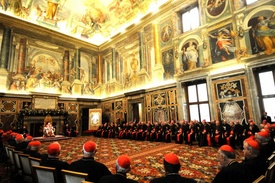
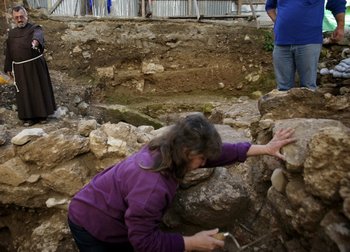 Franciscan Friar Jack Karam (left) stands near Israel
Antiquities Authority workers at the excavation site of the remains of the
first dwelling in Nazareth, Israel, that can be dated back to the time of
Jesus. Archaeologist Yardena Alexandre (unseen) says remains of a wall, a
hideout and a cistern were found after builders dug up an old convent courtyard
in the northern Israeli city. (AP Photos/Dan Balilty)
Franciscan Friar Jack Karam (left) stands near Israel
Antiquities Authority workers at the excavation site of the remains of the
first dwelling in Nazareth, Israel, that can be dated back to the time of
Jesus. Archaeologist Yardena Alexandre (unseen) says remains of a wall, a
hideout and a cistern were found after builders dug up an old convent courtyard
in the northern Israeli city. (AP Photos/Dan Balilty)
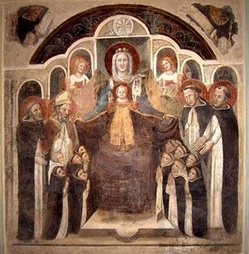
O God, who for the salvation of souls didst place the Order of Preachers under the special protection of the most Blessed Virgin Mary, and wast please to pour out upon it her constant benefits: grant unto thy suppliants that we may be led unto the joy of heaven through the aid of that same protectress whose memory we revere today. Through Christ our Lord. Amen.
Pray for the Friars Preachers on the anniversary of papal approval in 1216.
Bethlehem, make ready,
for Eden has been opened for all.
Ephrathah, be alert,
for the Tree of Life has blossomed forth
from the Virgin in the cave.
Her womb has become a spiritual paradise
wherein the Divine Fruit was planted,
and if we eat of it,
we shall live and not die like Adam.
Christ is coming forth to bring back to life
the likeness that had been lost in the beginning.
Bethlehem, make ready, for Eden has been opened for all!
(a Byzantine poetic text for the time before the Nativity of the Lord)
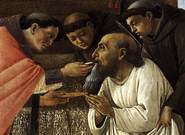 The way of peace leads to the altar and into the
mystery of the Eucharist, the actualization of the Kingdom here and now. From
the altar, the light of the Resurrection penetrates into all that, in our
lives, remains shadowy and locked. With the Virgin of the Annunciation, we have
only to believe in Love and, believing, say faith's simple "Yes." Our "little
strength" is of no consequence. Let us go in to the Eucharist to be
overshadowed by the power of Love. Love will do the rest for "God is love" (1
Jn 4:16 ) and " no word shall be impossible with God" (Lk 1:37). (MDMK)
The way of peace leads to the altar and into the
mystery of the Eucharist, the actualization of the Kingdom here and now. From
the altar, the light of the Resurrection penetrates into all that, in our
lives, remains shadowy and locked. With the Virgin of the Annunciation, we have
only to believe in Love and, believing, say faith's simple "Yes." Our "little
strength" is of no consequence. Let us go in to the Eucharist to be
overshadowed by the power of Love. Love will do the rest for "God is love" (1
Jn 4:16 ) and " no word shall be impossible with God" (Lk 1:37). (MDMK)
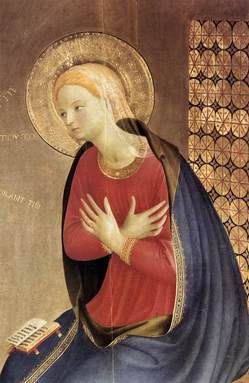 We have all had the occasion by a moment to sense more
intensely the presence of Christ in the Eucharist during the celebration of the
Mass, during Eucharistic adoration, or even in the Tabernacle, when we walk
into a church. There is Christ. He is there whether we sense or experience His
presence. But precisely because this is the case, we are sometimes given
to experience that He is present. Such experience is not the source of faith,
but in some way it is its consequence.
We have all had the occasion by a moment to sense more
intensely the presence of Christ in the Eucharist during the celebration of the
Mass, during Eucharistic adoration, or even in the Tabernacle, when we walk
into a church. There is Christ. He is there whether we sense or experience His
presence. But precisely because this is the case, we are sometimes given
to experience that He is present. Such experience is not the source of faith,
but in some way it is its consequence.O Wine of Virgins and Lily of Purity, Who by a touch of Your hand heals the body and cleanses the soul; Who by dwelling in the womb of Your Mother has made her the purest of the pure and most admirable among virgins; We beseech You, through Your Pure Nativity and through the intercession of Your Mother and Saint Joseph, Your Chosen One, to grant us to be pure in soul and body and clean in act clean and thought, that we may serve You with a clean heart and pure body all the days of our lives. Amen.
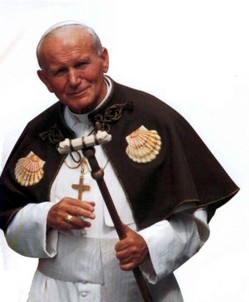 Pope Benedict recognized John Paul II as living a life of heroic virtue upon the recommendation of the Congregation for Saints. There are various steps the Church takes when she investigates someone for possible canonization. This is the second of four of the steps, next being "beatification." The Church will now refer to John Paul as the "Venerable Servant of God ..." but there is no public ceremonial for bestowing this title as there is when a person is beatified or canonized.
Pope Benedict recognized John Paul II as living a life of heroic virtue upon the recommendation of the Congregation for Saints. There are various steps the Church takes when she investigates someone for possible canonization. This is the second of four of the steps, next being "beatification." The Church will now refer to John Paul as the "Venerable Servant of God ..." but there is no public ceremonial for bestowing this title as there is when a person is beatified or canonized.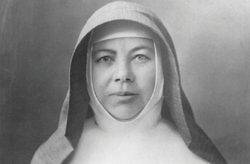
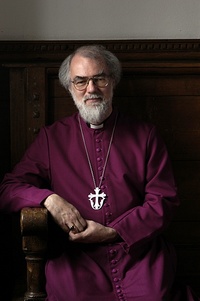 The Most Reverend Rowan Williams, Archbishop of Canterbury will be lecturing in Yonkers, NY, on Saturday, 30 January 2010, 12:30 p.m.
The Most Reverend Rowan Williams, Archbishop of Canterbury will be lecturing in Yonkers, NY, on Saturday, 30 January 2010, 12:30 p.m.O Admirable Leader Who gains the obedience of Your people not by the severity of Your judgment but by the sweetness of Your love and Your welcome sojourn among us. We beseech You, through Your Pure Nativity and through the intercession of Your Mother and Saint Joseph, Your Chosen One, to teach us complete obedience to Your holy commandments and to submit to our superiors, not for fear of punishment but by a willing surrender of mind and heart, with gladness of heart and spirit. Amen.
O Hope of the Patriarchs and longing of the Gentiles, in Your Nativity You have granted us hope. The joy of this hope has called together the Shepherds, the Magi and all believers in Your Holy Name, and led them to adore You with all the acclaim of their hearts. We beseech You, through Your Pure Nativity and through the intercession of Your Virgin Mother and Saint Joseph, Your Chosen One, to keep us, by Your grace, from attachment to earthly goods. Teach us not to depend only on ourselves and the weak ones of this world, but to rely only on Your Fatherly direction and Your Divine Providence. Attract our hearts and minds to reflect on Your heavenly riches and to aspire and long for them above. Amen.
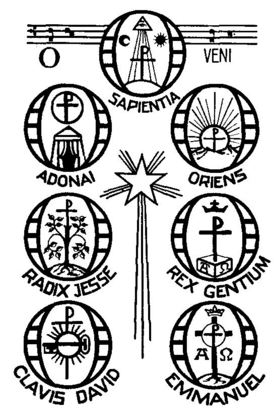
Advent slightly shifts its focus beginning tomorrow (December 17) when the antiphons for Vespers known as the Greater Antiphons, but more commonly known as the O Antiphons, are sung.
These biblical texts are sung as the verse introducing the Magnificat song at Vespers. Most people know these Great Antiphons as the hymn called "O Come, O Come Emmanuel" (Veni, Veni, Emmánuël). Each verse of the hymn is a reworded version of the O Antiphons, with the last being the first verse. Rather unfortunately too many priests and church musicians/choir leaders have little understanding of why one would hold off from signing "O Come, O Come Emmanuel" at Mass until this time of Advent, and even then, why one would spread the verses out over the days ahead. (I wonder if we can get our act together to respect the Liturgy and its history to allow the flourishing of the theology to dig more deeply into our hearts and minds.)
Each O Antiphon addresses Jesus with a title which comes from the prophecies of Isaiah that anticipate the coming of the Messiah. The first letters of the titles in the original Latin in reverse order spell "Ero Cras," meaning "Tomorrow, I will come."
December 17 - O Sapiéntia: O Wisdom Who camest out of the mouth of the Most High, reaching from end to end and ordering all things mightily and sweetly: come and teach us the way of prudence.
December 18 - O Adonái: O Adonai, and Leader of the house of Israel, Who didst appear to Moses in the flame of the burning bush, and didst give unto him the law on Sinai: come and with an outstretched arm redeem us.
December 19 - O Radix Jesse: O Root of Jesse, Who standest for an ensign of the people, before Whom kings shall keep silence, and unto Whom the Gentiles shall make their supplication: come to deliver us, and tarry not.
December 20 - O Clavis David: O Key of David, and Sceptre of the house of Israel, Who openest and no man shutteth, Who shuttest and no man openeth: come and bring forth from his prison-house, the captive that sitteth in darkness and in the shadow of death.
December 21 - O Óriens: O Dawn of the East, Brightness of the light eternal, and Sun of justice: come and enlighten them that sit in darkness and in the shadow of death.
December 22 - O Rex Gentium: O King of the Gentiles and the Desired of them, Thou Corner-stone that makest both one: come and deliver man, whom Thou didst form out of the dust of the earth.
December 23 - O Emmánuël: O Emmanuel, our King and Lawgiver,
the Expected of the nations and their Savior: come to save us, O Lord our God.
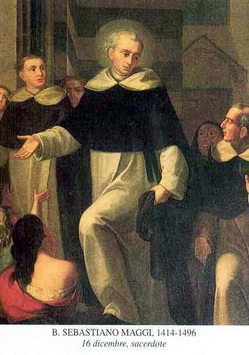
Strengthened by holy intercession, O Sebastian, Confessor of the Lord, those here present , that we who are burdened the weight of our offenses. Maybe relieved by the glory of thy blessedness, and may thy guidance attain eternal rewards.
God of faithfulness, you made Blessed Sebastian and
outstanding example of evangelical perfection and truth. By following his
example may we enter the path to perfect charity and deepen the life of the
spirit through penance and so obtain your glory and eternal life.
More on Blessed Sebastian Maggi may be found here.
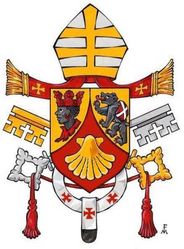
Vatican City, 15 December 2009 (VIS) - Made public today was Benedict XVI's Motu Proprio, "Omnium in mentem". The document is dated 26 October 2009 and contains two variations to the Code of Canon Law (CIC), variations which have long been the object of study by dicasteries of the Roman Curia and by national episcopal conferences.
The document published today contains five articles modifying canons 1008, 1009, 1086, 1117 and 1124. According to an explanatory note by Archbishop Francesco Coccopalmerio, president of the Pontifical Council for Legislative Texts, these variations "concern two separate questions: adapting the text of the canons that define the ministerial function of deacons to the relative text in the Catechism of the Catholic Church (1581), and suppressing a subordinate clause in three canons concerning marriage, which experience has shown to be inappropriate".
The variation to the text of canon 1008 will now limit itself to affirming that "those who receive the Sacrament of Orders are destined to serve the People of God with a new and specific title", while canon 1009 "will be given an additional third paragraph in which it is specified that the minister constituted into the Order of the episcopate or the priesthood receives the mission and power to act in the person of Christ the Head, while deacons receive the faculty to serve the People of God in the diaconates of the liturgy, of the Word and of charity".
Archbishop Coccopalmerio's note then goes on to explain that the other changes contained in the Motu Proprio all concern the elimination of the clause "actus formalis defectionis ab Ecclesia Catholica" contained in canons 1086 para. 1, 1117 and 1124. This clause, "following much study, was held to be unnecessary and inappropriate", he writes.
"From the time the Code of Canon Law came into effect in the year 1983 until the moment of the coming into effect of this Motu Proprio, Catholics who had abandoned the Catholic Church by means of a formal act were not obliged to follow the canonical form of celebration for the validity of marriage (canon 1117), nor were they bound by the impediment concerning marriage to the non-baptised (canon 1086 para. 1), nor did they suffer the prohibition on marrying non-Catholic Christians (canon 1124). The abovementioned clause contained in these three canons represented an exception ... to another more general norm of ecclesiastical legislation according to which all those baptised in the Catholic Church or received into her are bound to observe ecclesiastical laws (canon 11).
"With the coming into effect of
the new Motu Proprio", Archbishop Coccopalmerio adds, "canon 11 of
the Code of Canon Law reacquires its full force as concerns the contents of the
canons thus modified, even in cases were there has been a formal abandonment.
Hence, in order to regularise any unions that may have been made in the
non-observance of these rules it will be necessary to have recourse, if
possible, to the ordinary means Canon Law offers for such cases: dispensation
from the impediment, sanation, etc".
The Latin and Italian texts are here.
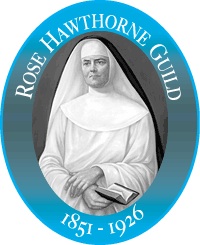 Lord God, in your special love for the sick, the poor and the
lonely, you raised up Rose Hawthorne (Mother Alphonsa) to be the servant of
those afflicted with incurable cancer and with no one to care for them. In
serving the outcast and the abandoned she always strove to see in them the face
of your Son. In her eyes, those in need were always Christ's poor.
Lord God, in your special love for the sick, the poor and the
lonely, you raised up Rose Hawthorne (Mother Alphonsa) to be the servant of
those afflicted with incurable cancer and with no one to care for them. In
serving the outcast and the abandoned she always strove to see in them the face
of your Son. In her eyes, those in need were always Christ's poor.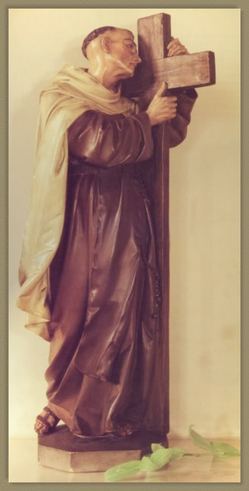 Father, You endowed John of the Cross with a spirit of
self-denial and a love of the cross. By following his example, may we come to
the eternal vision of Your glory.
Father, You endowed John of the Cross with a spirit of
self-denial and a love of the cross. By following his example, may we come to
the eternal vision of Your glory.
The fundamental principle of St. John's theology is that God is All and the creature is nothing. Therefore, in order to arrive at perfect union with God, in which sanctity consists, it is necessary to undergo an intense and profound purification of all the faculties and powers of soul and body. The Ascent--Dark Night traces the entire process of purgation, from the active purification of the external senses to the passive purification of the highest faculties; The Living Flame and The Spiritual Canticle describe the perfection of the spiritual life in the transforming union. The entire path to union is "night" because the soul travels by faith. St. John of the Cross presents his teaching in a systematic manner, with the result that it is spiritual theology in the best sense of the word; not because it is systematic, but because it uses as its sources Sacred Scripture, theology and personal experience.
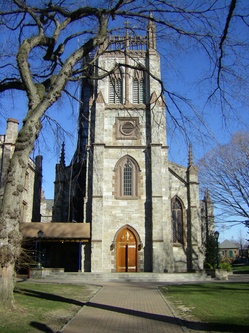
Yesterday, about 50 friends of Avery Cardinal Dulles met at Fordham University Church to remember him before God on the occasion of his first anniversary of death.
Sister Anne-Marie Kirmse, O.P., the Cardinal's friend and administrative assistant, gathered us for Mass celebrated by Jesuit Father Joseph McShane with the homily delivered by Jesuit Father Joseph Leinhard. There were 17 concelebrants; three of whom were secular priests (friends of Dulles') and the balance were old Jesuits. Five of the Cardinal's Fairfield County Communio group (myself included) were present as the faithful remnant. As was recognized, we all miss the Cardinal's wisdom, affection and much understated humor.
In his homily Father Leinhard focused our attention on the moment by recalling Saint Augustine's 9th book of the Confessions where Augustine tells us of his mother's passing unto eternal life. In between her various states of consciousness and unconsciousness Monica came to a see life anew. She called her sons together telling them when she died to bury her body anywhere but to remember her before the Lord, wherever they may be. As for Monica, so for Avery.
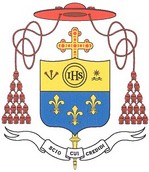
Why remember? Our thinking of Cardinal Dulles is, as Fr. Leinhard said, wholly different than what went before. Remembering Avery before God is not quite the same as reminding God who Avery was, just in case God may have forgotten. What is important about Avery is not his prestigious family, his education, his conversion to Catholicism, his entrance into the Society of Jesus nor his ordination to the priesthood, not even his ministry as a theologian nor his acceptance of the dignity of the Cardinalate. What is important about Avery is encapsulated in the motto he assumed with the coat of arms when given the cardinal's hat by Pope John Paul II, Scio Cui Credidi, I know whom I have believed.
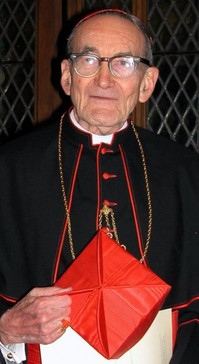
The reading from 2 Timothy 1 can be taken as Saint Paul's last will and testament as it is his answer to a question of belief: Christ has resurrected from the dead and I have preached his gospel. For both Saint Paul and Cardinal Dulles their lives deeply changed in making an act of faith in Christ for Christ became the key to all understanding. In Dulles' Craft of Theology, the last sentence of chapter 1 speaks to his belief in Christ where he recounts a vision of Christ in which we look past the "now" and look to Christ as the center of all things.
At the altar of the Lord we pray for the dead following the ancient Christian practice. In the Roman Canon of the Mass we pray that the Lord will remember "those who have gone before us marked with the sign of faith" granting them the blessedness (happiness) of light and peace. Our liturgical prayer places hope in our hearts that those who sleep in the Lord will have the victory over sin and death. Our confidence relies on the sign of faith received in baptism, that which marks each person not with a pious sign but with indelible mark.
Our remembrance of Avery and of every one of our beloved dead therefore, is brought home in the consideration that not to remember is to consign our family and friends to oblivion is awful. The Christian proposal is lux perpetua: light for the blind, peace for the will.
Eternal rest grant unto Avery Cardinal Dulles, O Lord, and let perpetual light shine upon him. May his soul and the souls of the faithful departed rest in rest. Amen.
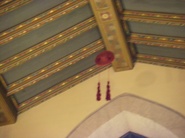
A sentimental
remembrance of Cardinal Dulles was the hanging of a cardinal's red hat and
tassels. No longer given by the Pope to cardinals, the red hat is occasionally
made for a cardinal and hung in his church by his family and friends. In New York's Saint Patrick's
Cathedral there are 4 cardinal hats hanging (but none since Cardinal Spellmen
are hanging there). The Archdiocese of Chicago did the same for Cardinal Joseph
Bernardin back in 1997.
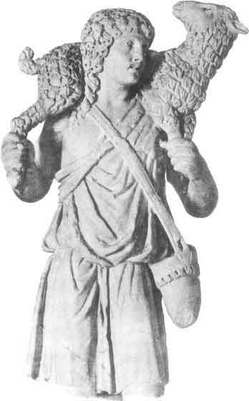 Prayers were requested by my friend, Suzanne, for a
friend, Tina Lillig, one of the pioneers of Catechesis of the Good Shepherd (CGS)
here in the U.S., and indeed Director of the National Association of the CGS. Tina
suffered a stroke Friday afternoon while at work. She underwent surgery at
Loyola Medical Center (Chicago). Tina died early this morning. Here is the note
sent by her friends at CGS:
Prayers were requested by my friend, Suzanne, for a
friend, Tina Lillig, one of the pioneers of Catechesis of the Good Shepherd (CGS)
here in the U.S., and indeed Director of the National Association of the CGS. Tina
suffered a stroke Friday afternoon while at work. She underwent surgery at
Loyola Medical Center (Chicago). Tina died early this morning. Here is the note
sent by her friends at CGS: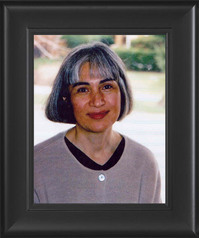
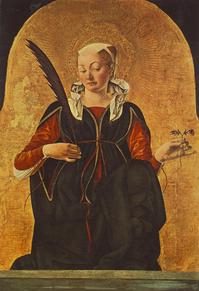
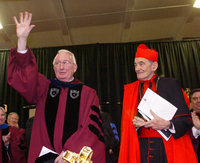 O God, Who was pleased to raise They servant Avery Robert Dulles to the dignity of the cardinalate, we beseech Thee, vouchsafe to admit him to the fellowship of Thine Apostles forevermore. Amen.
O God, Who was pleased to raise They servant Avery Robert Dulles to the dignity of the cardinalate, we beseech Thee, vouchsafe to admit him to the fellowship of Thine Apostles forevermore. Amen.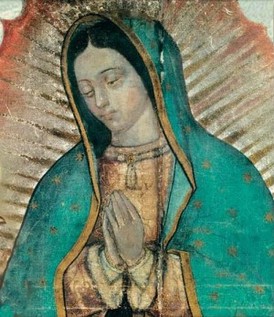 Our Lady of Guadalupe, Mystical Rose, make intercession
for the holy Church, protect the Sovereign Pontiff, help all those who invoke thee in their necessities, and
since thou art the ever Virgin Mary and Mother of the true God, obtain for us from thy most holy Son the
grace of keeping our faith, sweet hope in the midst of the bitterness of life, burning
charity and the precious gift of
final perseverance. Amen.
Our Lady of Guadalupe, Mystical Rose, make intercession
for the holy Church, protect the Sovereign Pontiff, help all those who invoke thee in their necessities, and
since thou art the ever Virgin Mary and Mother of the true God, obtain for us from thy most holy Son the
grace of keeping our faith, sweet hope in the midst of the bitterness of life, burning
charity and the precious gift of
final perseverance. Amen.Almost two weeks ago Pope Benedict sent a message to the president of the Italian Bishops' Conference, Angelo Cardinal Bagnasco, who is chairing a meeting where the agenda is talking about God, of all things. Well, it beats talking about bishops, nuns and the environment all the time. This topic interests me not in the sense of mere curiosity but because it is taking seriously my seeking the face of God (this topic ought to concern all people who consider themselves Catholic, spiritual and/or religious). To say God interests me sounds like an academic exercise; it is and it is not entirely that. God is interesting to me because seeking God is like no other search I know of, for it concerns my entire self and it intersects all that I do in the world. Is God totally unknowable, the Mystery and desirous of a personal relationship with me (and you)? The Pope makes some great points in these few paragraphs. The curious points are emphasized below.
On the occasion of the Congress "God Today: With or Without Him Everything Changes," which is taking place in Rome from December 10-12, I wish to express to you, venerated Brother, to the Italian Episcopal Conference and, in particular, to the Committee for the Cultural Project, my profound appreciation for this important initiative, which addresses one of the great topics that has always fascinated and questioned the human spirit.
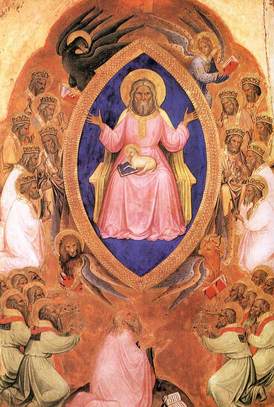
The question of God is also central in our time, in which man is often reduced to one dimension, the "horizontal," considering openness to the Transcendent as irrelevant for his life. The relationship with God, instead, is essential for humanity's journey and, as I have had the occasion to affirm many times, the Church and every Christian, in fact, have the task to make God present in this world, to attempt to open to men access to God.
Planned from this perspective is the international event of these days. The breadth of the approach to the important topic that characterizes the meeting, will make possible the sketching of a rich and articulated picture of the question of God, but above all it will be a stimulation for a profound reflection on God's place in the culture and life of our time.
On one hand, in fact, an attempt is being made to show the different ways that lead to affirming the truth about the existence of God, that God which humanity has always known in some way, even in the chiaroscuro of his history, and who revealed himself with the splendor of his face in the covenant with the people of Israel and, beyond that, in every measure and hope, in a full and definitive way, in Jesus Christ.
He is the Son of God, the Living who enters into the life and history of man to illumine him with his grace, with his presence. On the other hand, the desire is precisely to bring to light the essential importance that God has for us, for our personal and social life, for understanding ourselves and the world, for the hope that illumines our way, for the salvation that awaits us beyond death.
Directed to these objectives are the numerous interventions, according to the many points of view which will be the object of study and exchange: from philosophical and theological reflection on the witness of the great religions; from the impulse to God, which finds its expression in music, literature, the figurative arts, the cinema and television; to the development of the sciences, which attempt to read in depth the mechanisms of nature, fruit of the intelligent work of God the Creator; from the analysis of the personal experience of God to the consideration of the social and political dynamics of an already globalized world.
In a cultural and spiritual situation such as the one we are living in, where the tendency grows to relegate God to the private sphere, to consider him irrelevant and superfluous, or to reject him explicitly, it is my heartfelt hope that this event might at least contribute to disperse that semi-darkness that makes openness to God precarious and fearful for the men of our time, though he never ceases to knock on our door.
The experiences of the past, although not remote to us, teach us that when God disappears from man's horizon, humanity loses its direction and runs the risk of taking steps to its own destruction. Faith in God opens man to the horizon of certain hope, which does not disappoint; it indicates a solid foundation on which to base life without fear; it calls for abandoning oneself with confidence in the hands of the Love which sustains the world.
To you, cardinal, to all those who have contributed to prepare this congress, to the speakers and to all the participants I express my cordial greeting with the desire for the full success of the initiative. I support the works with prayer and with my apostolic blessing, propitiator of that light from on High, which makes us capable of finding God, our treasure and our hope.
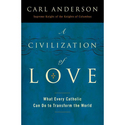
A Civilization of Love - What Every Catholic Can Do to Transform the World (2008) by Carl Anderson, the head of the Knights of Columbus has a new edition, Una Civilta dell'Amore.
Watch the book launch (video clip) in Rome and read a CNA news brief and a review of the book.
I also recommend the book.
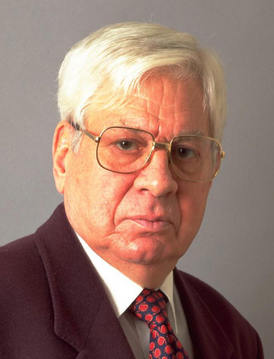
Archbishop Timothy M. Dolan, Archbishop of New York celebrated an evening Solemn Mass at St. Patrick's Cathedral on December 4th to commemorate of the 5th anniversary of entrance into eternal life of Dr. Fernando Rielo, the founder of the Idente Missionaries. His Eminence, Edward Cardinal Egan, archbishop emeritus of NY, Bishop Gerald T. Walsh, Rector/President of St. Joseph's Seminary, the Rev. Msgr. Robert Ritchie, Rector of St. Patrick's Cathedral and Rev. Msgr. James P. Cassidy, Assistant Principal Chaplain of the American Association of the Order of Malta and parish vicar of St. Patrick's Cathedral were also present. Members of the Idente Missionary Women's and Men's branches and members of the Idente Family from New Jersey, Long Island and the five New York City boroughs also participated in the Eucharistic Celebration.
During his homily, Archbishop Dolan affectionately referred to Fernando Rielo as "our Founder," stated that Rielo knew what holiness was and proposed him as an "example for our Advent preparation." The Archbishop praised Jesus for the "for the gift of Fernando Rielo and for the gift of the Idente Missionary Family."
The Idente Missionaries, recently approved as an institute of consecrated life of pontifical right, were founded by Fernando Rielo on June 29, 1959 and are currently present in four continents and in over twenty countries. Dr. Rielo who was a mystical poet and a metaphysician and also founded several cultural and humanitarian institutions including the World Prize for Mystical Poetry that bears his name, Idente Youth and the Fernando Rielo Foundation.
Idente Missionaries strive to live holiness in common, take a vow to defend the Chair of Saint Peter and to make Christ known in the universities. They particularly work in the academic field and with youth who have lost their faith or are seeking to renew their faith and live a life of holiness. Dr. Rielo's metaphysics is a new model that, consisting in the genetic conception of the principle of relation, rejects the principle of identity and establishes a perfect symmetry between metaphysics and theology for both study the same axiom -the Absolute Subject in metaphysics and the Most Holy Trinity in theology.
His work with youth led him to found the Idente Youth's World Youth Parliament (WYP) where young people can not only manifest their concerns and expose new values but also commit themselves to become the change they want to see in others, in their communities and in the world. The WYP is to hold a Plenary Session in New York in August 2010 entitled: Towards a Magna Carta of Values for a New Civilization.
The Idente Missionaries are
currently ministering in two parishes in the Bronx, are professors in two
universities and are chaplains in universities in both the Archdiocese of New
York and in the Diocese of Brooklyn.
Here is Zenit article on the Idente Missionaries.
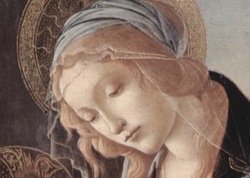 It is truly meet and just, right and available to
salvation, that we should give thanks to thee, O Lord God, almighty: and that we
should, whilst invoking Thy power, celebrate the feasts of the blessed Virgin
Mary; from whose womb grew the Fruit, which has filled with the Bread of
angels. That Fruit which Eve took from us when she sinned, Mary has restored to
us, and it has saved us. Not as the work of the serpent is the work of Mary. From
the one, came the poison of our destruction; from the other, the mysteries of
salvation. In the one, we see the malice of the tempter; in the other, the help
of the divine Majesty. Be the one, came death to the creature; by the other the
resurrection of the Creator, by whom human nature, now not captive but free, is
restored; and what it lost by its parent Adam, it regained by its Maker Christ.
It is truly meet and just, right and available to
salvation, that we should give thanks to thee, O Lord God, almighty: and that we
should, whilst invoking Thy power, celebrate the feasts of the blessed Virgin
Mary; from whose womb grew the Fruit, which has filled with the Bread of
angels. That Fruit which Eve took from us when she sinned, Mary has restored to
us, and it has saved us. Not as the work of the serpent is the work of Mary. From
the one, came the poison of our destruction; from the other, the mysteries of
salvation. In the one, we see the malice of the tempter; in the other, the help
of the divine Majesty. Be the one, came death to the creature; by the other the
resurrection of the Creator, by whom human nature, now not captive but free, is
restored; and what it lost by its parent Adam, it regained by its Maker Christ.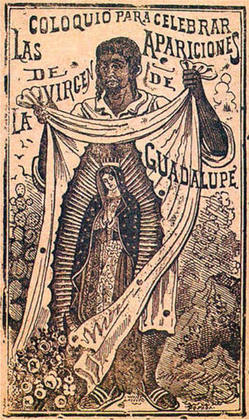
Lord God, through Saint Juan Diego You made known the love of Our Lady of Guadalupe toward Your people. Grant by his intercession that we who follow the counsel of Mary, our Mother, may strive continually to do Your will.
The Vatican biography on Saint Juan Diego and Pope John Paul's 2002 canonization homily. Also, there is a part of the beatification homily here.
The Pope said in part at the canonization:
Happy Juan Diego, true and faithful man! We entrust to you our lay brothers and sisters so that, feeling the call to holiness, they may imbue every area of social life with the spirit of the Gospel. Bless families, strengthen spouses in their marriage, sustain the efforts of parents to give their children a Christian upbringing. Look with favor upon the pain of those who are suffering in body or in spirit, on those afflicted by poverty, loneliness, marginalization or ignorance. May all people, civic leaders and ordinary citizens, always act in accordance with the demands of justice and with respect for the dignity of each person, so that in this way peace may be reinforced.
Beloved Juan Diego, "the talking eagle"! Show us the way
that leads to the "Dark Virgin" of Tepeyac, that she may receive us
in the depths of her heart, for she is the loving, compassionate Mother who
guides us to the true God. Amen.
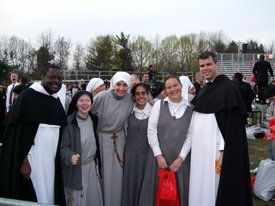
You wouldn't believe it, but young people discerning a vocation to the consecrated life and/or priesthood in the USA, today, face the problem of debt.
Personal debt is one thing and we all have to watch our spending. And we are the ones who to repay the credit card companies, not someone else. It is a very true experience to say that consumerism often replaces Christ as the focus of our lives.
BUT the significant problem at hand is the amount of education debts young people have to pay off before following the vocation given to them. Many young people went to the university, received a good education and now felt called to serve the Lord and the Church as a priest or sister and can't because they have repay their college loans. It is the responsible thing to do. It is also the thing that will prevent someone from actually fulfilling their calling. Large college debts make a person ineligible from entering a religious order or a diocesan formation program. Some religious orders will make some arrangement if the debt is "reasonable" especially if the candidate is "worthy." Many will not because their own income is not capable to lend that kind of assistance. Again, personal debts are the responsibility of the person. The video on the Mater Ecclesiae website (see below) speaks of grants and the tough call made in discerning who gets help, who doesn't. These grants assist in paying off those college debts.
Perhaps as an act of charity we could make a charitable offering to one of the agencies helping these young men and women deal with their educational debts. Christmas is a time for giving with love.
This article, "Debt, the Vocation Killer" gives some perspective on the matter. Plus, there are worthy organizations that help in dealing with the educational debt like the Laboure Society and Mater Ecclesiae Fund for Vocations.
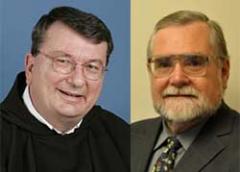
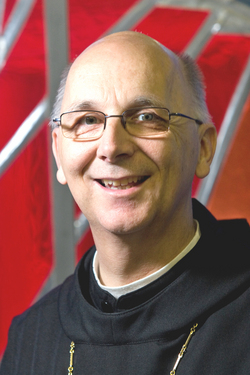
Abbot Dr. Marian Eleganti, 54, until now the Abbot of the Abbey of Saint Otmasberg (Abtei St. Otmarsberg), has been nominated by the Holy Father to be an auxiliary bishop of the Diocese of Chur, Switzerland. He was elected abbot of his monastery on 15 July 1999 and in 2003 defended a doctoral dissertation on Romano Guardini at the University of Salzburg. Abbot Marian speaks seven languages and is a published author.
The Abbey of Saint Otmasberg belongs to the Congregation of Saint Ottilien, a grouping of missionary Benedictine monks who take vows to a particular monastery as other monks do, but since mission work is their common apostolate, monks are assigned from various monasteries for this mission work in monasteries in other parts of the world. This congregation of monks have a slightly different understanding of the monastic of stability but no less vital for monasticism and for the Church. There are two monasteries of the Congregation of Saint Ottilien in the USA: Saint Paul's Abbey (Newton, NJ) and Christ the King Priory (Schuyler, NE).
Bishop-elect Marian is one of 32 Benedictine monks ordained to the episcopacy worldwide.
May God grant many years to Bishop-elect Marian and may Saint Ambrose sustain the bishop with his prayers. So, we pray for Abbot Marian and for his Benedictine community who will now prepare to elect a new abbot.
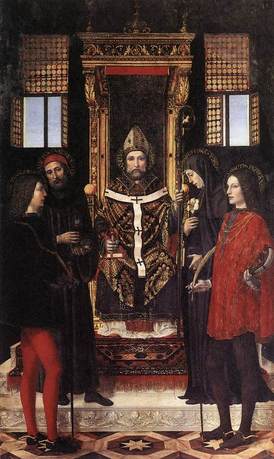
But lest perchance any one should speak against as it were the littleness of the Spirit and from this should endeavour to establish a difference in greatness, arguing that water seems to be but a small part of a Fount, although examples taken from creatures seem by no means suitable for application to the Godhead; yet lest they should judge anything injuriously from this comparison taken from creatures, let them learn that not only is the Holy Spirit called Water, but also a River, as we read: "From his belly shall flow rivers of living water. But this He said of the Spirit, Whom they were beginning to receive, who were about to believe in Him" (Jn 7:38-39).
So, then, the Holy Spirit is the River, and the abundant River, which according to the Hebrews flowed from Jesus in the lands, as we have received it prophesied by the mouth of Isaiah (Is 66:12). This is the great River which flows always and never fails. And not only a river, but also one of copious stream and overflowing greatness, as also David said: "The stream of the river makes glad the city of God.
For neither is that city, the heavenly Jerusalem, watered by
the channel of any earthly river, but that Holy Spirit proceeding from the
Fount of Life, by a short draught of Whom we are satiated, seems to flow more
abundantly among those celestial Thrones, Dominions and Powers, Angels and
Archangels, rushing in the full course of the seven virtues of the Spirit. For
if a river rising above its banks overflows, how much more does the Spirit, rising
above every creature, when He touches the as it were low-lying fields of our
minds, make glad that heavenly nature of the creatures with the larger
fertility of His sanctification. (St. Ambrose, On the Holy Spirit, Book One, 176-178)
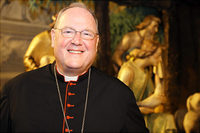 Today the NY Daily News published a letter written by Archbishop Timothy M. Dolan, archbishop of New York. I am happy that the News published this letter because it is not only a message for Christians, but people of faith, and those looking for the gift of faith. The substance of the Archbishop's letter can be summarized in this way: this is a time for peace among peoples; for love and reconciliation. And even though not all go about observing this season in the same way, we ought to respect one another!
Today the NY Daily News published a letter written by Archbishop Timothy M. Dolan, archbishop of New York. I am happy that the News published this letter because it is not only a message for Christians, but people of faith, and those looking for the gift of faith. The substance of the Archbishop's letter can be summarized in this way: this is a time for peace among peoples; for love and reconciliation. And even though not all go about observing this season in the same way, we ought to respect one another! 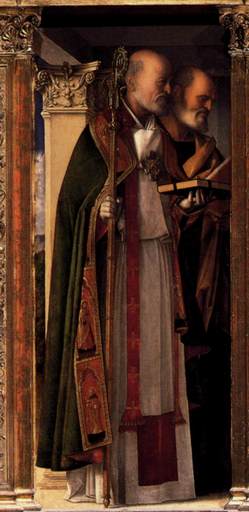
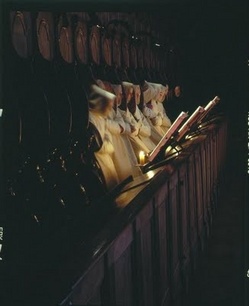 The Liturgy is at once both the end to which the
action of the Church tends and at the same time the source from which flows all
her strength. We, who have left everything to seek God alone and to possess him
more fully, should carry out the liturgical functions with particular
reverence. For when we accomplish the Liturgy, especially the Eucharistic
celebration, we have access to the Father through his Son, the Word Incarnate
who suffered and was glorified, in the outpouring of the Holy Spirit. Thus we achieve
communion with the Most Holy Trinity.
The Liturgy is at once both the end to which the
action of the Church tends and at the same time the source from which flows all
her strength. We, who have left everything to seek God alone and to possess him
more fully, should carry out the liturgical functions with particular
reverence. For when we accomplish the Liturgy, especially the Eucharistic
celebration, we have access to the Father through his Son, the Word Incarnate
who suffered and was glorified, in the outpouring of the Holy Spirit. Thus we achieve
communion with the Most Holy Trinity.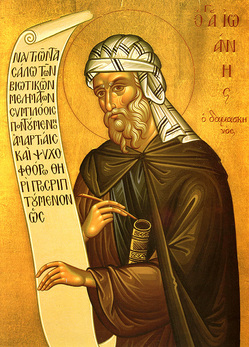 Saint John of Damascus spent most of his life in the monastery of
Saint Sabas, near Jerusalem, under Muslim rule, indeed, protected by it. Born in Damascus c. 676, John received a classical and theological education, and followed
his father in a government position under the Muslims. He resigned after a few years so that he could go to the monastery of Saint Sabas. Saint John is considered the last of
the Greek Church Fathers (his writings)
Saint John of Damascus spent most of his life in the monastery of
Saint Sabas, near Jerusalem, under Muslim rule, indeed, protected by it. Born in Damascus c. 676, John received a classical and theological education, and followed
his father in a government position under the Muslims. He resigned after a few years so that he could go to the monastery of Saint Sabas. Saint John is considered the last of
the Greek Church Fathers (his writings)Every so often something interesting happens in the brutish lives we live. Tuesday night was one of those times, at a seminary no less, that we had an interesting conversation about something many of us knew nothing about: stars, aliens and the connection with faith. We had a visit from Jesuit Father David Brown whose work is at the Vatican's Observatory. Funny that David and I are classmates but our journeys took us in different directions. Of course, he went up...that is, he studies the stars and I just went...
As a coinky-dinky, Stephen Colbert chatted with the Vatican astronomer, Jesuit Brother Guy Consolmagno, about extraterrestrial life. Who would have thought that the seminary and Mr. Colbert were doing the same stuff: thinking about life beyond the present moment.
Watch the interview here...
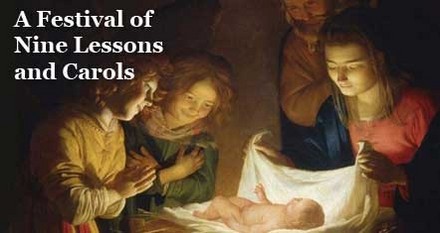 Join the Dominican Friars of Saint Catherine of Siena Church
& Priory for a Candlelight Lessons and Carols, featuring the Master Singers
of Archmere Academy and the Choir of the Church of the Holy Child Jesus. David
J. Ikfovits will conduct the choirs. The organist will be Father Jordan
Kelly, O.P.
Join the Dominican Friars of Saint Catherine of Siena Church
& Priory for a Candlelight Lessons and Carols, featuring the Master Singers
of Archmere Academy and the Choir of the Church of the Holy Child Jesus. David
J. Ikfovits will conduct the choirs. The organist will be Father Jordan
Kelly, O.P.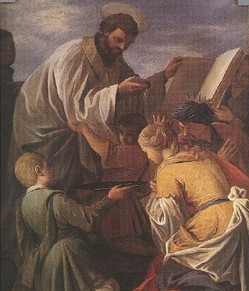
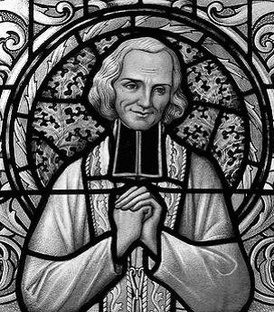
In response to questions about the Plenary Indulgence for the Year for Priests, the decree says that, "all truly penitent priests"--having confessed their sins and received Holy Communion--may obtain a Plenary Indulgence each day by devoutly praying Lauds or Vespers before the Blessed Sacrament, and by making themselves available "with a ready and generous heart" for the Sacrament of Penance and the other sacraments.
This Plenary Indulgence may be applied to the souls of priests in purgatory. Priests may also obtain a partial indulgence so often as they offer prayers to ask for the grace of sacerdotal holiness. As I mentioned the other day about praying for souls of our priests, this an opportunity for priests to come to the assistance of their brother priests in purgatory!
The decree also makes generous provision for the lay faithful. They may obtain a Plenary Indulgence on the opening and closing days of the Year of the Priest and on the 150th anniversary of the death of Saint John Mary Vianney (August 4, 2009), on the First Thursday of the Month, or on any other day established by the ordinaries of particular places for the good of the faithful. The particular conditions are given below.
An example, a prayer suitable for obtaining the Plenary Indulgence would be:
O Jesus, Eternal Priest, keep Thy priests within the shelter of Thy Sacred Heart, where none may touch them. Keep unstained their anointed hands, which daily touch Thy Sacred Body. Keep unsullied their lips, daily purpled with Thy Precious Blood. Keep pure and unworldly their hearts sealed with the sublime mark of the priesthood. Let Thy holy love surround them from the world's contagion. Bless their labors with abundant fruit, and may the souls to whom they minister be their joy and consolation here and their everlasting crown hereafter. Mary, Queen of the Clergy, pray for us; obtain for us numerous and holy priests. Amen.
To acquire a plenary indulgence it is necessary to perform the work to which the indulgence is attached and to fulfil three conditions: sacramental confession, Eucharistic Communion and prayer for the intentions of the Supreme Pontiff. It is further required that all attachment to sin, even to venial sin, be absent.
 The Connecticut Bike Project
is a program that collects and distributes donated bicycles in good working
condition to financially challenged children and adults who need them. Besides
offering them to children for recreation the aim of the endeavor is to provide
needed transportation to work and for running errands to the economically
disadvantaged; individuals with physical or mental disabilities that prevent
them from driving, ex-offenders re-entering the workforce and other folks who
can't afford a vehicle or are without licenses to drive.
The Connecticut Bike Project
is a program that collects and distributes donated bicycles in good working
condition to financially challenged children and adults who need them. Besides
offering them to children for recreation the aim of the endeavor is to provide
needed transportation to work and for running errands to the economically
disadvantaged; individuals with physical or mental disabilities that prevent
them from driving, ex-offenders re-entering the workforce and other folks who
can't afford a vehicle or are without licenses to drive.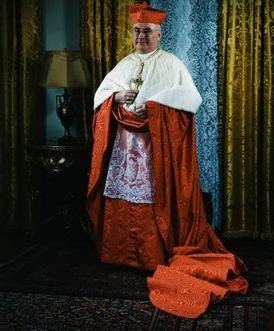 The Archdiocese of New York recalls the service of one of their prominent churchmen, Francis Joseph Cardinal Spellman on the 42nd anniversary of falling asleep in the Lord.
The Archdiocese of New York recalls the service of one of their prominent churchmen, Francis Joseph Cardinal Spellman on the 42nd anniversary of falling asleep in the Lord.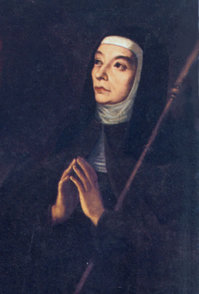
 The
Pontifical Council for Social Communications has opened a Web portal to collect
and provide information on Catholic media around the globe. The portal, www.intermirifica.net, was launched in
collaboration with the Latin American Episcopal Conference and SIGNIS, the
World Catholic Association for Communication. It is currently in Spanish, English and French; Portuguese is forthcoming.
The
Pontifical Council for Social Communications has opened a Web portal to collect
and provide information on Catholic media around the globe. The portal, www.intermirifica.net, was launched in
collaboration with the Latin American Episcopal Conference and SIGNIS, the
World Catholic Association for Communication. It is currently in Spanish, English and French; Portuguese is forthcoming. Today is the Feast of Saints Edmund Campion and
Robert Southwell. It is also the launch date of a webzine venture called the New Jesuit
Review -- guys trying to do the right thing. So far, so good.
Today is the Feast of Saints Edmund Campion and
Robert Southwell. It is also the launch date of a webzine venture called the New Jesuit
Review -- guys trying to do the right thing. So far, so good.God of our weary years, God of our silent tears, O Good and gracious God, you are the God of health and wholeness.
In the plan of your creation, you call us to struggle in our sickness and to cling always to the cross of your Son. Father, we are your servants. Many of us are now suffering with HIV or AIDS.
We come before you, and ask you, if it is your holy will, to take away this suffering from us, to restore us to health and to lead us to know you and your powerful healing, love of body and spirit.
We ask you also to be with those of us who nurse your sick ones. We are the mothers, fathers, sisters, brothers, children, and friends of your suffering people. It is so hard for us to see those whom we love suffer. You know what it is to suffer. Help us to minister in loving care, support, and patience to your people who suffer with HIV and AIDS.
Lead us to do whatever it will take to eradicate this illness from the lives of those who are touched by it, both directly and indirectly. Trusting in you and the strength of your Spirit, we pray these things in the name of Jesus. Amen.
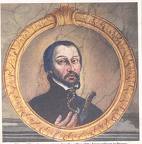
Almighty,
eternal God, You raised up among the people of England and Wales the holy
martyrs Edmund, Robert and their companions, and willed that they should
imitate Christ, who died to redeem the world. Grant that, by their
intercession, Your people may be strengthened by the same faith and love and
always rejoice in Your gift of unity.
On Saint
Robert Southwell, plus there's more here.
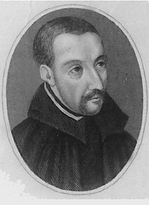
Behold the
father is his daughter's son,
The bird that
built the nest is hatched therein,
The old of years
an hour hath not outrun,
Eternal life to
live doth now begin,
The Word is
dumb, the mirth of heaven doth weep,
Might feeble is,
and force doth faintly creep.
O dying souls,
behold your living spring;
O dazzled eyes,
behold your sun of grace;
Dull ears,
attend what word this Word doth bring;
Up, heavy
hearts, with joy your joy embrace.
From death, from
dark, from deafness, from despairs
This life, this
light, this Word, this joy repairs.
Gift better than
himself God doth not know;
Gift better than
his God no man can see.
This gift doth
here the giver given bestow;
Gift to this
gift let each receiver be.
God is my gift,
himself he freely gave me;
God's gift am I,
and none but God shall have me.
Man altered was
by sin from man to beast;
Beast's food is
hay, hay is all mortal flesh.
Now God is flesh
and lies in manger pressed
As hay, the
brutest sinner to refresh.
O happy field
wherein that fodder grew,
Whose taste doth
us from beasts to men renew.
